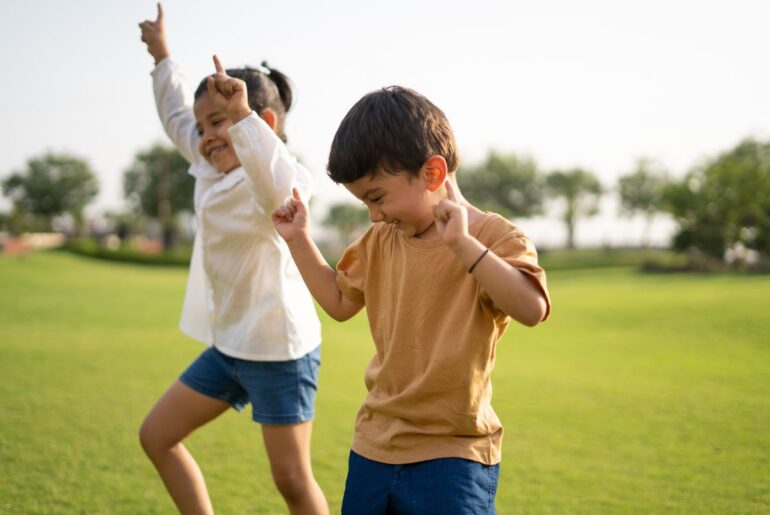Summer can feel like a balancing act to keep your kids entertained and engaged, while maintaining structure and keeping the peace. And when you’re trying to keep a limit on kids’ screentime, it can be overwhelming and stressful if you don’t have the right tools. If you’re looking for simple, fun, and developmentally enriching activities that can help to fill those long summer days, music games can be your new go-to.
Playing music games doesn’t require being a music teacher or owning any instruments in your home. You also don’t need to know how to read music. The following easy, screen-free games are the best way to get your children’s bodies moving, their brains thinking, and their creativity flowing. They’ll build a deeper connection to rhythm and sound while ensuring some healthy family bonding time.
Here are some of the best parent-tested music games that kids will love.
Freeze dance, with a twist
Most families are well aware of how to play the freeze dance game: Turn on some music and have everyone dance, but when the music stops, everyone must freeze in their poses. You can elevate this simple game with just a few fun twists.
First, when the music stops, you can call out different shapes or things they must freeze into. Think of things like animals, a statue, or even objects they can try to turn their bodies into (and try not to laugh). You can even take it a step further and follow a theme such as dancing in the jungle, so that everyone freezes as a different jungle animal.
You can also make this game more interactive by challenging everyone to freeze together as a team, building something together. That way, instead of playing against each other, they’re all on the same side.
Guess the sound
If you’re looking for something to encourage your kids to listen more (let’s face it—who isn’t?), you can play this fun, quiet-time game. It only requires a few household items, such as a chair, a towel, and objects that make sounds.
Hide behind someone who’s sitting in a chair, and hang up a towel or blanket so no one can see what you’re doing. Make a sound with whatever items you have, such as pouring water, crumpling up some paper, tapping a glass with a utensil, etc., and the kids have to guess what made the sound. This activity helps to sharpen auditory skills, which is a major component of music and language development.
Kids can be super creative with this game to get more challenging items that make sounds within the house. You can even split into teams and have each team guess sounds together to make it competitive.
Name that tune
The “name that tune” game is a great one to turn to in any situation, such as on a car ride or at a picnic. All you have to do is hum a few initial bars of a tune from a familiar song and have your teammate guess the song.
This game can also be played in teams, and you can raise the stakes by saying you’ll be able to name the tune in so many notes, just like the old game show. For example, if you can name that tune in five notes or less, then you’re the winner.
Homemade instruments
This activity focuses on exploration and creativity, and is perfect for younger children. Give your kids a mission to create their very own instrument using simple objects around the house, and you can even give them some items to start and then allow them to search the rest of the house for more tools to put it together.
Some great items to make homemade instruments include paper towels or toilet paper rolls, plastic containers, stainless steel pan lids, rubber bands over a shoebox, utensils clanged together, etc. You can allow kids to “lead the band” through the house with their instruments, and be surprised at how much time they’ll spend experimenting with different sounds and the accomplishment they’ll feel by making something themselves.
Rhythm copycat
Playing the copycat game is similar to Simon Says, but with beats! You simply clap, tap, or stomp a rhythm and have your kids try to repeat it the same way. You can start simple with some claps before adding in stomps, snaps, or clicks. Once kids get the hang of it, they can take over to create their own rhythms for copying.
You can incorporate real instruments if you’d like, or use your mouth to make sounds or clicks as an added creative outlet. These rhythm games are excellent stepping stones for kids to learn how to play the piano or another good beginner instrument. It creates a way to internalize patterns and timing, so they’ll have an ear and a knack for playing.
Musical storyteller
Creating stories is a great way to get kids using their imagination, and you can easily turn it into a music game. Consider having someone be the main “storyteller,” and kids as the background musician(s) who use their voices, instruments, bodies, or household items to set the scene.
For example, if the story included a bad thunderstorm, the musical parts may be children hitting the side of the stove or washer to create the “thunder.” They could also pour water into a pitcher or glasses to make the sound of rain. If the character is tiptoeing, they could use soft little finger taps on a hard surface.
The possibilities of sound are endless, and help to foster creativity, listening, emotions, and expression. These skills help pave the way for music education and make their story more magical.
Song creation
One last kid-engaging music game you can instill this summer is creating songs. Song structure is excellent for anyone who likes to invent things, and you can start this game with a simple melody, a repetitive phrase in a musical line that’s easy to remember. You can all put your heads together as a family, working as a team to create lyrics and come up with songs about a funny story, vacation, your pets, or even just the daily routine around the house.
You can take things further by recording it or creating a backing track. The best part is you don’t have to worry about singing on key or doing things perfectly—it’s just a great way to have fun together, bond as a family, and make music a part of your everyday life.
The goal with these music games isn’t perfection, it’s connection. Kids will learn best when they are interactive and playing together. Music games are excellent for developing cognitive, motor, and social skills in a fun way that doesn’t feel like they’re learning. Keep your kids’ brains and bodies engaged and take some time to play these games so you can laugh, dance, and make long-lasting musical memories together.







